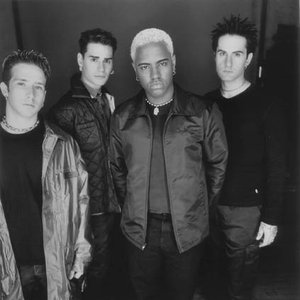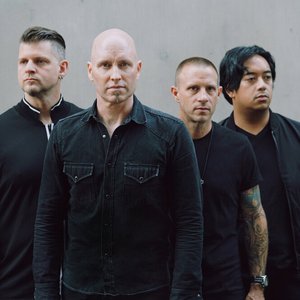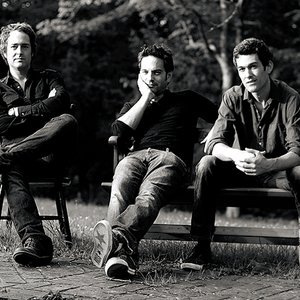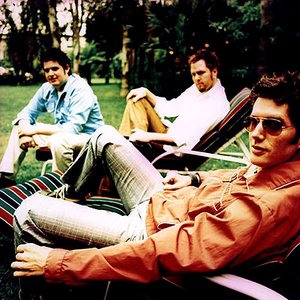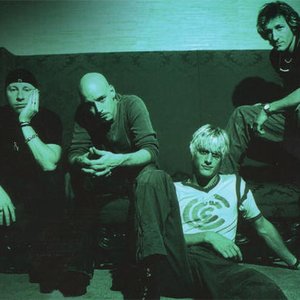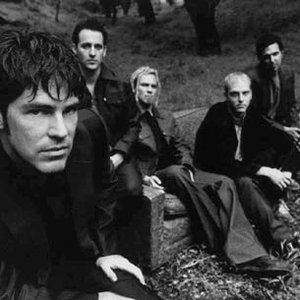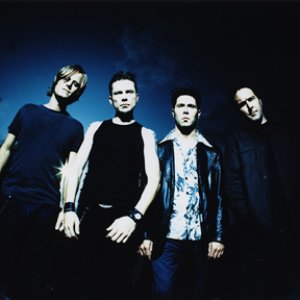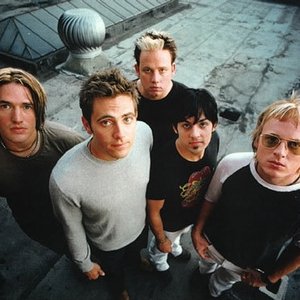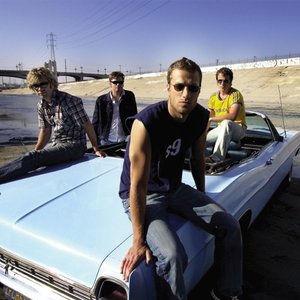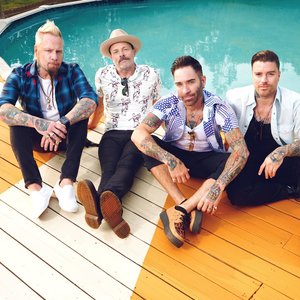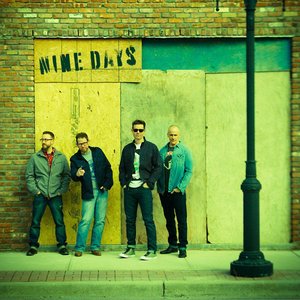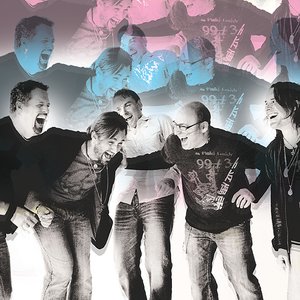Biografia
John Stephens - Vocals, Guitar, Keyboards
Michael Raphael - Guitar
Tommy Gruber - Bass
Brian Burwell - Drums
—————————————————————-
THE BEGINNING
Neve originally formed in 1996 as an idea in John Stephens' bedroom studio. As Chapter 29 (John's first band) began to disintegrate, John, along with bassist Tommy Gruber, pushed onward recording new songs on their own.
Later that year, Chapter 29-producer Robert Lear introduced John to a manager named Richard Rashman. Richard immediately took an interest in John & Tommy and began funding their musical development.
Several songs which would later be included on Neve's major label debut ("3 Years", "Trip And Glide") had already been written and recorded in John's bedroom studio at this time.
John & Tommy began auditioning guitar players and drummers one after another. The band even played a few small shows with odd lineups. It wasn't until Richard Rashman essentially forced John & Tommy to accept his protegé, guitarist Michael Raphael, into the band that Neve's lineup began to solidify. Drummer Brian Burwell came as part of the package with Mike.
In 1997, the newly-formed quartet began an intense period of songwriting and growth. In what seemed like a flash, Neve had a powerful repertoire of songs and was playing packed club shows in the L.A. area.
Neve co-manager, Waddell Solomon – who worked alongside Richard Rashman – sent some of John & Tommy's home demos to major L.A. radio station Y107 who had a show called "Locals Only", dedicated to the discovery of new, unsigned, local bands.
Y107 DJ, Chase (Christian Hand), immediately featured Neve on his show and began playing home demos of "Digital On" and "Same Old Story" on the air. This repeated airplay – in the #2 market in the country – made waves in the industry and ignited a huge buzz around Neve.
Neve's managers were able to use this airplay, combined with Neve's powerful live show and strong songs, to gather the interest of major label record companies. By November of 1997, John Weakland of Columbia Records was already knocking at the door.
Columbia courted Neve immediately. With the news that an unsigned band already had a song on the radio, it only took one show at the Sunset Strip's Coconut Teaszer in Hollywood for John Weakland to start talking contracts. Right after the show, Weakland called Columbia Records Senior A&R Director, Randy Jackson (later of American Idol fame), and told him that he needed to see Neve right away.
Randy Jackson got on board and started working with the band. With the news that Columbia was interested, other major labels began to follow suit and Neve began a series of private showcases for record companies such as Elektra, Epic, Interscope and more. The fact that Columbia was there from the beginning meant a lot to the band and the boys continued to grow closer to John Weakland and Randy Jackson.
In December 1997, Randy Jackson invited Neve to record a two-song demo at the renowned Westlake Studios in Hollywood, CA. John had just written a brand new song called "She Comes Up" just two weeks prior and the band decided to record it with Randy.
While in the studio, Randy and John renamed the song "It's Over Now" and the demo was complete. The song was sent to Columbia Records headquarters in New York City where Senior Vice President Will Botwin immediately recognized its hit potential and scheduled a trip out to L.A. to see Neve for himself.
By Christmas, Columbia Records had offered Neve a record contract and the band officially became Sony/Columbia recording artists.
COLUMBIA RECORDS
For the early part of 1998, Neve wrote new songs and continued to grow as artists. Columbia gave the band six months to finish writing their debut album, then began to look for producers. In September, the band hit it off with producer Don Gilmore. At the time, Don had produced albums for Eve 6 and Lit and would later go on to produce Linkin Park and Avril Lavigne.
In the fall of 1998, Columbia Records Senior VP of A&R, John Kalodner, fell in love with the song "It's Over Now" and included it on the soundtrack for the Dimension/Miramax motion picture, The Faculty, with huge artists such as Garbage, Sheryl Crow, Oasis, and Creed.
John Kalodner sent Neve into the studio with Grammy Award-winning producer Matt Serletic (matchbox twenty, Santana) to produce and record the song. Two weeks later, "It's Over Now" was finished and ready for the soundtrack. No one in the band or at the label expected what would happen next.
In December 1998, The Faculty soundtrack was released. The Class Of '99 (featuring Layne Staley of Alice In Chains and Tom Morello of Rage Against The Machine) had recorded a cover version of Pink Floyd's "Another Brick In The Wall" which was slated as the lead single.
Against all odds – and against the basic rules and structure of the music industry – Neve's song "It's Over Now" started getting airplay on its own. Longtime supporter Chase at L.A.'s Y107 was the first to play the song and it wasn't long before radio giant KROQ followed suit. The staff at Columbia Records was dumbstruck. They had done nothing to make this happen. "It's Over Now" grew at radio organically.
Once the song entered regular rotation on KROQ, over 50 more commercial Alternative radio stations across the U.S. immediately added the song, making "It's Over Now" the #1 Most Added song to Modern Rock radio that week. No one was prepared.
John, Michael, Tommy & Brian were still in the early stages of recording their debut album with producer Don Gilmore at NRG Recording Studios in Hollywood, yet they already had a single on the radio and it was climbing the charts.
This launched the band into a blur of both excitement and anxiety. Obviously everyone was happy that the song was on the radio, but people who knew the music business well were also concerned that the proper mechanisms for supporting a radio hit were not in place. And they were right. Columbia Records did not know how to handle this scenario.
"It's Over Now" went on to become the #1 most-requested song on KROQ and ultimately reached the Billboard Top 20. The song was a national hit. Unfortunately, Columbia in the United States was not ready to push Neve full force.
SUCCESS IN JAPAN
In April 1999, Neve got a call from Sony Music in Japan. The Faculty soundtrack had been released internationally and Japan immediately fell in love with the band. Top executives at Sony Japan raced to get their hands on the recently completed Neve album and make the most of The Faculty's setup. It worked.
Less than a month later, "It's Over Now" hit the Top 5 in Tokyo. On May 26, 1999, Neve's debut album Identify Yourself (in Japan) was released to support the single. It sold more than 30,000 copies in its first month and everyone was ecstatic. Due to the immediate success of the song and the album, Neve was asked to play Japan's enormous Fuji Rock Festival later that year.
In July 1999, Neve traveled to Japan and spent 3 weeks performing and visiting radio and TV stations across the country, culminating with Fuji Rock where the band performed for nearly 25,000 people alongside artists such as Rage Against The Machine and The Black Crowes. Neve was more at home in Japan than they were in the United States.
CONFUSION IN AMERICA
When Neve returned to L.A., Columbia Records was still without a plan and months away from a possible release date. "It's Over Now" was still on the radio, but without an album to follow it up, the airplay could not last. The inevitable decline of radio support came in late 1999 when Columbia Records failed to push and work Neve the way their counterparts in Japan had. It remains controversial to this day that a major record company would make the mistake of allowing a hit single on the radio without the proper support.
Months passed. The band and their management were dumbstruck by Columbia's failure to commit to a marketing and imaging plan for the band – even though it was easy and obvious in Japan. Despite the band's clear committment to their alternative rock roots (and their success on Alternative Rock radio in the U.S.), Columbia became defiant about marketing Neve to an alternative demographic and began drawing up plans to make Neve a pop band.
THE GREAT MISTAKE
Sometime in early 2000, Pam Edwards at Portrait/Columbia in New York inherited the Neve project and decided she would soften the band’s edges and market them to a "younger audience". The band was furious, but Pam held the cards as an executive at the label who could ultimately decide Neve's fate there.
Neve's management were passive and weak. They were afraid to disagree with Pam and potentially upset their relationship with the label. By March, Pam had completely revamped Neve's image with new "boy band" photoshoots and album artwork. Even though Neve had given Columbia a hit single by being themselves, Pam Edwards felt the need to turn them into something else.
The band felt pressured to go along with the label even though they hated their ideas. Pam Edwards basically told Neve they had to accept her plans or she would not release their album at all. The band had no options. In April 2000, Columbia committed to their "boy band with guitars" marketing plan – against the band's will – and scheduled a June release. Even though the album had several other contenders as second single, Columbia re-released "It's Over Now" to radio, this time going to Mainstream Top 40 and other Pop formats. This was more than a year and a half after "It's Over Now" originally took off on its own at Alternative and Modern Rock.
To everyone's delight, the song was well received at Pop radio and "It's Over Now" began to climb the Mainstream charts. Top 40 program directors became instant fans of the band. But it was confusing, overall, for Neve's early fans and new listeners failed to connect to a band who didn't feel comfortable with their new, forced identity. Columbia pushed an unsettling, bland image onto Neve and people could sense it.
On June 27, 2000 – more than a year after Neve's release in Japan and original radio success in the States – Columbia finally released the re-packaged NEVE album. It sold a disappointing 6,000 copies in its first month.
The band was obviously shaken, but they took consolation in the fact that they had a strong second single, "Absent", which would go to radio next. In fact, support for "Absent" went all the way to the top of the Columbia Records ladder and everyone agreed it was a sure thing.
One month later, 10,000 CDs of the "Absent" radio single were manufactured. "Absent" got a priority release date on the Columbia radio calendar. Neve even flew to New York and played a private acoustic show for radio mogul Tom Poleman of Z100 at Columbia Radio Exec Charlie Walk's Manhattan loft. Poleman was ready to add "Absent" to the most powerful Mainstream Top 40 radio station in the United States and the flagship of the Clear Channel network.
Something amazing happened next.
THE END
Eleven days before "Absent" was scheduled to hit radio full force, Columbia Records President & CEO Donnie Ienner called a last-minute label conference on the 26th floor of his Sony Music headquarters in New York City. Ienner had been reviewing disappointing fiscal reports for the label and the recent negative effects of online peer-to-peer networks such as Napster. Neve's "It's Over Now" had been downloaded from Napster more than 100,000 times without producing a single cent in revenue for the label.
Columbia Records, as well as the entire music industry at large, was taking a significant financial hit. Other major labels had begun downsizing and were looking for ways to cut expenses. It was at this time – in this very meeting – that Donnie Ienner laid off approximately 50 Columbia employees across the country. The day became known as "Black Friday".
For Neve, something else happened in this meeting that would prove fatal. Donnie raised Columbia's radio release calendar and began examining artists and singles that were slated for release. He began speaking about Neve's second single, "Absent", and how much he loved the song and knew that Columbia could push it to #1.
Then he pulled out a recent SoundScan report which documented current album sales for artists and bands all across the musical spectrum. He found the bands Vertical Horizon and Nine Days, two bands he deemed to be in the same musical genre as Neve who had both recently achieved #1 radio hit singles. (Vertical Horizon's "Everything You Want" and Nine Days' "Absolutely (Story Of A Girl)" both went to #1.)
Donnie then shared the sales results for both of these bands. Vertical Horizon had sold approximately 600,000 CDs (at the time) and Nine Days about 250,000. "For bands who achieved #1 radio hits", he said, "these sales figures are hugely disappointing. When Columbia Records pushes songs to #1, we expect platinum or multi-platinum albums to follow – no less."
Donnie's analogy was clear. He was arbitrarily comparing Neve to Vertical Horizon and Nine Days and said that even though he was sure "Absent" was a #1 hit song, sales results for "artists in this genre" were not justifying the expense of huge radio promotion. "It will cost us $500,000 to make "Absent" a #1 hit at radio and we're just not seeing the sales results in this genre that we need to justify it."
In one grand sweep, Donnie pulled "Absent" off the radio release schedule and the 10,000 promotional CDs were sent to the incinerator. Neve was crushed. Word got back to the band and its management and no one knew what to say or do. It all seemed so unfair and yet made sense in some sick, music industry way. Would sales for Neve mirror sales for Vertical Horizon or Nine Days? Donnie seemed to think it would – and that wasn't big enough for Columbia.
Without a second single at radio, the sales for Neve's debut in the U.S. slowed to a stop at around 25,000 copies. The low numbers caused an immediate crumbling of band morale. Even close supporters and friends at Columbia Records in L.A. could sense the gloom that was beginning to settle overhead. Everyone watched as Neve's album faded away.
Neve played their last Columbia Records-era show in Chicago on June 9, 2001.
REUNION
After more than three years of separation, the original members of Neve reunited for a special reunion show at the Whisky A Go-Go in Hollywood, CA on December 4, 2004. The concert was sold out. Die hard fans flew to L.A. from all across the country to attend. Neve played again on July 1, 2005 when the band was asked to headline the City of Logan's annual 4th Of July event at the 30,000-seat Romney Stadium in Logan, Utah.
As descrições de artistas na Last.fm podem ser editadas por todas as pessoas. Sinta-se à vontade para contribuir!
Todo o texto inserido pelo usuário nesta página está disponível sob a licença Creative Commons Attribution/ShareAlike; termos adicionais podem ser aplicados.
